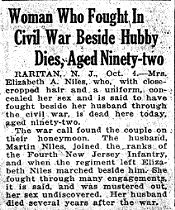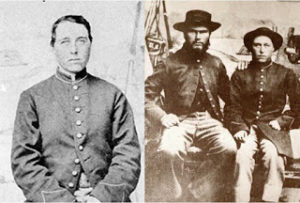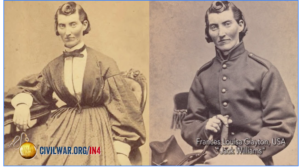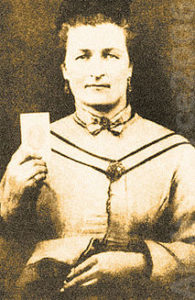The blue and gray of the Civil War had a surprising pink streak running through it. Even though women weren’t legally allowed to fight in the Civil War, it is estimated that somewhere around 400 women disguised themselves as men and went to war. Often without anyone discovering their true identities. We mentioned this fact on our Tidbit Tuesday this week and today’s blog will reveal some of their stories.
Military records reveal that women fought—and died—in the major battles of the Civil War, participating in clashes in Antietam, Fredericksburg, Gettysburg, and many others. Dressed as men, women took on a wide range of military roles in the Civil War. In a time when many couldn’t even conceive of a woman shooting at people, they fought in nearly every battle. Some were promoted, made officers and spies. Sarah Edmonds participated in the Peninsula Campaign as a soldier, spy, and courier—and even ended up working as a (male) nurse at Mansion House Hospital!

Much of the information available on female Civil War soldiers is found in their obituaries. (NARA, Records of the Adjutant General’s Office)
The women soldiers of the Civil War were mothers, wives, daughters, and sisters and were found in the armies of both the Confederacy and the Union. Some joined to be near a family member—a father, brother or husband. Others answered the recruitment calls found in newspapers and sheet music. The war was an opportunity to demonstrate their strongly held patriotism and beliefs. Some found freedom from strict gender roles. Women could travel and explore while serving, albeit dangerously, which was something that women during this time could not do without a chaperone.

Photograph of Albert D.J. Cashier, born Jennie Hodgers in 1843.
Female soldiers faced the same dangers as the men, but they also faced unique dangers. The biggest, most likely, was fear of discovery, which would lead to expulsion or imprisonment. Many women soldiers came from working-class backgrounds. They had adopted men’s clothing and male personas in their teens in order to obtain better pay and greater independence than “women’s work” could provide. Their familiarity with “men’s work” eased their transition to army life and helped them to evade detection. The presence of many underage soldiers in both armies also facilitated their deception; young women in uniform easily passed as beardless boys. The conditions of camp life—most soldiers slept fully clothed, rarely bathed, and relieved themselves in the woods—also made it possible to avoid scrutiny.
Most women not only evaded discovery, but also served with distinction. Official reports praised the military record of Pvt. Franklin Thompson (Sarah Edmonds), asserting that the young recruit was devoted to the regiment, “sharing in all its toils and privations, marching and fighting in the various engagements in which it participated…never absent from duty, obeying all orders with intelligence and alacrity, his whole aim and desire to render zealous and efficient aid to the Union cause.” After the war, Sarah Edmonds put up her uniform and resumed life as a woman, marrying and raising several children before successfully applying for a military pension in 1884. Other cross-dressing soldiers, however, lived the majority of their lives as men. One unnamed New Jersey woman, whose “military bearing” and “gallant conduct” in battle so impressed her senior officers that she was promoted from corporal to sergeant—shortly before she gave birth!

Left Sarah Edmonds dressed as a woman, Right Sarah disguised as a man in the Army, known as Franklin Thompson.
Sarah Pritchard, a woman from North Carolina, couldn’t stand to let her husband, Keith, go to war without her, so she cut her hair and enlisted as his young brother “Sammy.” When the troops would all go swimming, she would decline and stay behind in the tent. The jig was up when she was shot in the shoulder and sent home with Keith, who had faked an illness.

Sarah M Pritchard Blalock. She is holding a picture of her husband Keith.
Courtesy: Avery Museum
Although the experiences of women in the military were in many ways exceptional, women soldiers, like other groups of women in the Civil War era, sought—and found—ways to increase their independence and expand their horizons. The Civil War changed the nation’s perception of its citizens’ capabilities and catalyzed a new push for equality not only between races, but between genders as well. Clara Barton claimed that the four-year war advanced the social position of women by fifty years. Definitely an overlooked outcome of the war, but one that has helped today’s women in many ways!





